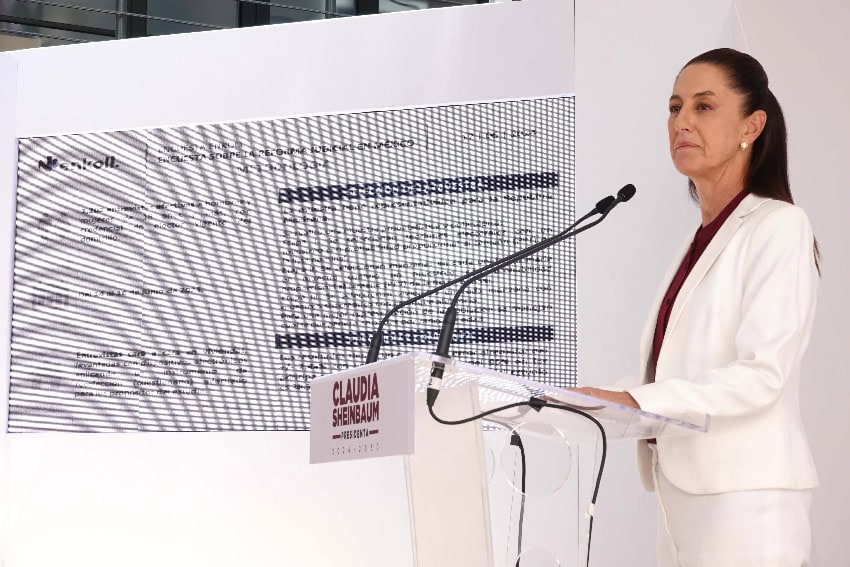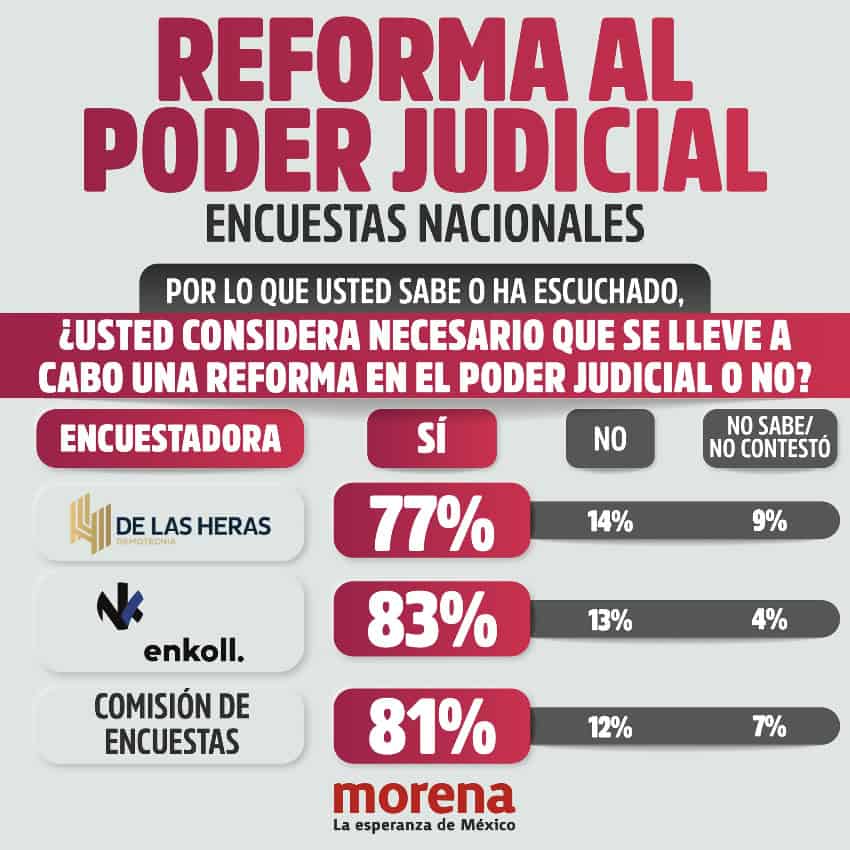A large majority of Mexicans are in favor of the controversial judicial reform proposal submitted to Congress by President Andrés Manuel López Obrador, according to the results of three polls commissioned by the ruling Morena party.
President-elect Claudia Sheinbaum announced the results of the polls at a press conference on Monday.

The judicial reform proposal — which seeks to allow citizens to directly elect Supreme Court justices and other judges, among other objectives — was sent to Congress in February as part of a large package of proposed constitutional changes.
Since Morena’s comprehensive victory in the June 2 elections, concerns over the likelihood of the approval of the reform proposals — particularly the judicial one — have caused the Mexican peso to depreciate around 8% against the US dollar.
Critics say that some of the proposals, including one to disband a number of autonomous government agencies, will reduce checks and balances on executive power in Mexico.
Sheinbaum supports the proposals, but pledged last week that there would be “broad consultation” before they are considered by the new Congress, which will be sworn in Sept. 1.
The surveys — conducted by the polling companies De las Heras and Enkoll, and Morena’s Polling Commission, at homes across the country — are part of the consultation process.
A total of more than 3,800 people responded to the three surveys, which were conducted between June 14 and 16.
The margin of error was between +/- 2.57% and +/- 2.9%, while the confidence level was 95%, according to the two polling companies and Morena’s Polling Commission.
4 in 5 respondents believe the judicial reform is necessary
Over 80% of respondents to the Enkoll (83%) and Morena (81%) polls said they believed that carrying out the judicial reform is necessary, while 77% of those polled by De las Heras said the same.

The percentage of respondents who said the reform wasn’t necessary ranged from 12%-14%, while the remainder of those polled didn’t respond or didn’t have an opinion one way or the other.
Of note is that around half of those polled — 54%, 51% and 49%, according to the different polls — hadn’t heard of the proposed reform before they were asked about in the survey.
However, the majority of those people were evidently not dissuaded from expressing support for the proposed reform, despite their lack of knowledge about it.
López Obrador argues that Mexico’s judiciary is at the service of the nation’s elite rather than ordinary people, and that it needs renewal. Sheinbaum agrees.
A key aim of the proposal is to allow citizens to elect Supreme Court justices from candidates nominated by the sitting president, the Congress and sitting Supreme Court justices themselves.
Among its other objectives are to reduce the number of Supreme Court justices from 11 to nine, to shorten their terms from 15 years to 12, and to cap their maximum permitted salary at the same level as that earned by the president.
Referring to the survey results, Sheinbaum said Monday that “a very high percentage of the population believes that it is necessary” to overhaul the judiciary.
She noted that the percentage of poll respondents who are in favor of the reform is even higher than the 59.75% support she attracted in the presidential election on June 2.
Around 7 in 10 respondents believe citizens should elect Supreme Court justices and other judges
Respondents to the three polls were specifically asked how Supreme Court (SCJN) justices should be chosen, and how other judges and magistrates should be selected.

Exactly three-quarters of respondents to both the Enkoll and Morena polls said that the Mexican people should elect SCJN justices, while 68% of those polled by De las Heras said the same.
Between 18% and 25% of the respondents said that the Senate should elect the justices, as is currently the case. A short list of three candidates are submitted to the Senate by the sitting president when a position for a justice becomes available.
However, late last year, López Obrador directly appointed Lenia Batres Guadarrama as a SCJN justice after the Senate on two occasions failed to endorse any of the candidates he put forward. It was the first time in Mexican history that a president made a direct appointment.
Asked how lower-ranking justices and magistrates should be chosen, around seven in 10 respondents again responded that citizens should elect them. Between 19%-24% of those polled said that the judicial power itself should choose the judges that preside over Mexico’s courts.
A majority of respondents believe all or most judges are corrupt
One in five of those polled by De las Heras said they believed that all justices, judges and magistrates are corrupt, while 17% of respondents to the Enkoll survey and 15% of those who spoke with Morena pollsters said the same.
Much larger numbers of people said that “the majority” of judges are corrupt: 44% (Enkoll); 40% (Morena) and 38% (De las Heras).

Thus 55%-61% of those polled either said that all or most judges are corrupt, sharing an opinion that López Obrador and other government officials have voiced on countless occasions.
Around three in 10 respondents (26%-34%) said that only a few judges are corrupt, while only 2%-5% of those polled said that no judges are corrupt. The remainder declined to share an opinion.
Almost 9 in 10 respondents support the creation of an independent judicial watchdog
The pollsters also asked respondents whether they agreed or disagreed with the creation of an independent body to oversee the judicial system, investigate alleged misdeeds and sanction judges where appropriate.
Between 85%-89% of respondents said they agreed with the idea, while only 7%-9% disagreed.
As the proposed judicial reform would change Mexico’s constitution, it requires support from two-thirds of lawmakers to pass Congress.
Morena and its allies won a supermajority in the lower house on June 2, but fell just short in the Senate, meaning that they will have to gain the support of a few opposition senators in order to approve constitutional reform proposals put forward by López Obrador and Sheinbaum, who will be sworn in as Mexico’s first female president on Oct. 1.
With reports from El Economista, Reforma and El Financiero
